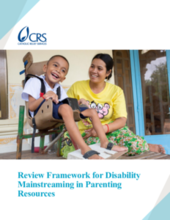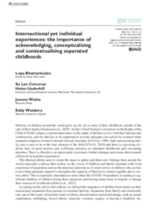Displaying 1131 - 1140 of 10391
This Framework for Disability Mainstreaming in Parenting Resources is a tool to help organizations and practitioners to review existing parenting resources in terms of information and content gaps, limitations of instructional guidance, and at-home activities. The aim of the framework is to ensure parenting resources are inclusive of the needs of parents of children with disabilities ages 0 to 17 years.
This article explores neighbour protective intervention (protective informal social control) in child neglect. It draws on narrative interviews with seventeen female parents from seven settlements in Ghana.
The Eastern and Southern Africa Regional Learning Platform hosted a webinar on April 13, 2022, featuring a panel of people with liv
This study looked at how well matched children in England are to their homes and the extent to which their participation, views, wishes and feelings are considered in the decision-making process. The study looked at a small group of children who have a very wide and diverse set of needs and who live in children’s homes that were visited by Ofsted inspectors in late 2019.
The internalizing behavior problems (IBPs) of left-behind children (LBC) due to parental migration are a widespread public health concern in China. A previous study showed that the detection rate of behavioral problems in the Hui was far higher than in the LBC of the Han nationality. However, to date, limited research has focused on IBPs in Chinese LBC of the Hui nationality. The aims of this present study are to explore the prevalence of IBPs and the influencing factors among the Hui LBC in the rural areas of China.
In this editorial published in the special edition of the Global Studies of Childhood journal focused on separated childhoods in April 2022, the authors aim to create the space to gather and share new findings from around the world, especially evidence that centres on the voices of children and family members with lived experience of separation, and on the practical experiences of social service workforce who are key to providing adequate support to strengthen the capacity of families to remain together and to reunite safely.
Typical large-group institutions for abandoned children or orphans are known to be bad for the development of children, but what about small-group care?
The International Data Alliance for Children on the Move (IDAC) held this webinar on April 11, 2022, to discuss the need for concrete data and information crucially needed to support affected children inside and outside Ukraine. Representatives of countries directly affected by the Ukrainian crisis as well as key partners on the ground shared their insights.
This book presents new and vivid findings concerning the extensive vulnerability of this population of children at the point of entry to care. It also shows that there is much to learn at an international level from the experiences of those involved in mandatory face-to-face post adoption contact - a uniquely Australian policy. The book provides evidence which shows how continuing post-adoption contact was experienced by adoptees and their adoptive parents. This book is open access, which means that you have free and unlimited access.
On 7 April 2022, the European Parliament adopted a resolution on "EU Protection of Children and Young People Fleeing the War Against Ukraine" calling for greater protection of children fleeing war in Ukraine, particularly vulnerable children, for the registration of children entering the EU from institutional care, as well as monitoring their well-being and location in the EU. MEPs called on member states to halt child adoptions in order to avoid further or permanent separation of children from their parents and families against their best interests.







